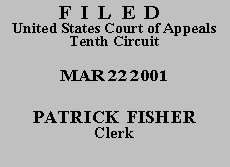

| WAYNE COOK,
Petitioner-Appellant, |
|
| v. | |
| GARY D. NEET; ATTORNEY
GENERAL OF THE STATE OF
COLORADO,
Respondents-Appellees. |
|
Petitioner Wayne Cook, appearing pro se, seeks a certificate of appealability to appeal the district court's denial of his 28 U.S.C. § 2254 petition. We deny a certificate of appealability and dismiss the appeal.
Cook pleaded guilty in state court to one count of sexual assault on a child by a person in a position of trust. His direct appeal was affirmed and his motion for post-conviction relief was denied. Cook filed his § 2254 petition in federal district court, contending he was coerced into confessing, he was coerced into signing the plea agreement, and he had ineffective assistance of counsel. The district court denied the petition for failure to exhaust state remedies.
Ordinarily, a state prisoner cannot obtain federal habeas corpus relief "unless it appears that the applicant has exhausted the remedies available in the courts of the State, or that there is either an absence of available State corrective process or the existence of circumstances rendering such process ineffective to protect the rights of the prisoner." 28 U.S.C. § 2254(b). The exhaustion requirement is satisfied if the federal issue has been properly presented to the highest state court, either by direct review of the conviction or in a post-conviction attack. Dever v. Kan. State Penitentiary, 36 F.3d 1531, 1534 (10th Cir.1994). A state prisoner bringing a federal habeas corpus action bears the burden of showing that he has exhausted available state remedies. Miranda v. Cooper, 967 F.2d 392, 398 (10th Cir. 1992).
Although Cook appealed his case to the highest state court and filed a motion for post-conviction relief in state court, he did not raise in those proceedings the three claims he raises in his habeas petition. The federal district court ordered Cook to show cause why his petition should not be denied for failure to exhaust state remedies. In his response, Cook did not claim he had raised the issues in his state actions. Cook argues that he sent a letter to the state court describing his concerns of coercion and ineffective assistance of counsel but the court struck the letter because he did not go through his appointed counsel. Cook did not appeal the striking of his letter and counsel did not raise these issues on appeal. Therefore, the letter did not exhaust Cook's claims.
Cook was permitted to proceed in forma pauperis in district court. The district court denied his motion to proceed in forma pauperis on appeal pursuant to 28 U.S.C. § 1915 because he had not "shown the existence of a reasoned, nonfrivolous argument on the law and facts in support of the issues raised on appeal." Record, Doc. 13. As the district court has certified in writing that this appeal was not taken in good faith, see 28 U.S.C. § 1915(3), and as the record shows the appeal lacks basis in law or fact, we deny Cook's motion to proceed in forma pauperis on appeal.
We DENY a certificate of appealability and DISMISS the appeal. We DENY the motion to proceed in forma pauperis on appeal. The mandate shall issue forthwith.
Entered for the Court
Mary Beck Briscoe
Circuit Judge
*.This order and judgment is not binding precedent, except under the doctrines of law of the case, res judicata, and collateral estoppel. The court generally disfavors the citation of orders and judgments; nevertheless, an order and judgment may be cited under the terms and conditions of 10th Cir. R. 36.3.